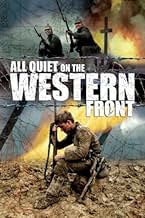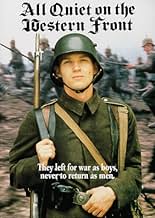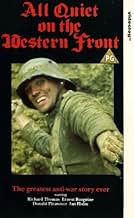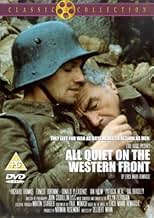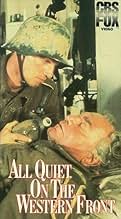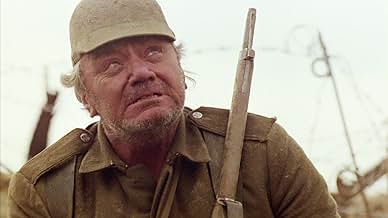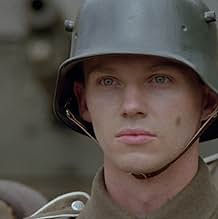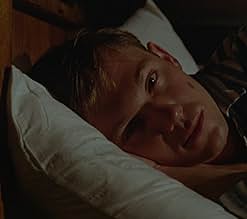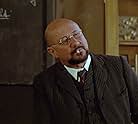IMDb-BEWERTUNG
7,1/10
11.045
IHRE BEWERTUNG
Die Geschichte junger deutscher Freiwilliger im Ersten Weltkrieg an der Westfront, die zu spät das Grauen und die Sinnlosigkeit des Krieges erkennen und einen sinnlosen Heldentod sterben.Die Geschichte junger deutscher Freiwilliger im Ersten Weltkrieg an der Westfront, die zu spät das Grauen und die Sinnlosigkeit des Krieges erkennen und einen sinnlosen Heldentod sterben.Die Geschichte junger deutscher Freiwilliger im Ersten Weltkrieg an der Westfront, die zu spät das Grauen und die Sinnlosigkeit des Krieges erkennen und einen sinnlosen Heldentod sterben.
- Regie
- Drehbuch
- Hauptbesetzung
- 1 Primetime Emmy gewonnen
- 2 Gewinne & 6 Nominierungen insgesamt
Paul Mark Elliott
- Josef Behm
- (as Mark Elliott)
David Bradley
- Albert Kropp
- (as Dai Bradley)
Matthew Evans
- Friedrich Muller
- (as Mathew Evans)
Marie-Noëlle Barre
- French Girl
- (as Marie Noelle-Barre)
Empfohlene Bewertungen
This is a very good anti-war movie. It shows how the young and naive are being brain-washed to think that somehow it is their duty to kill and die. Big words like Fatherland, Kaiser, God, Patriotism. But it is always the young generation that does the dying, whilst the old men discuss strategy over a beer. War has lost whatever legitimacy it ever may have had when the leaders left the front line to lead from the back, safe in their headquarters miles away from the killing. Sending young boys to their death whilst claiming it is eventually for the Good is the ultimate cowardice. Some get their come-uppance, such as Cpl Himmelstoss, but most live their lives in the comfortable cocoon of their self-righteousness the school teacher, the father, the Kaiser himself.
But sometimes a young soldier sees through the scam, as when Paul kills a Frenchman by sheer instinct, only too late realising what he has been forced to do to someone who might have been his brother. But even then the cultural impregnation is too strong for him to follow his true human feelings and draw the only logical conclusion. And of course in the end he pays the price himself. Destroyed - for what?
That is the lesson that we all should take to heart, to this very day.
A very good film based on an exceptional book.
But sometimes a young soldier sees through the scam, as when Paul kills a Frenchman by sheer instinct, only too late realising what he has been forced to do to someone who might have been his brother. But even then the cultural impregnation is too strong for him to follow his true human feelings and draw the only logical conclusion. And of course in the end he pays the price himself. Destroyed - for what?
That is the lesson that we all should take to heart, to this very day.
A very good film based on an exceptional book.
The made for TV and 'remake' labels have tended to devalue All Quiet on the Western Front. With successors like Das Boot and Saving Private Ryan, it also seems less visionary now. However, All Quiet on the Western Front is a superb adaptation of Erich Maria Remarque's classic novel. The novel, published in 1929 by the 31 yr old Remarque was an instant classic. I remember reading it nearly two decades ago and its still one of the best books I've ever read. The Hollywood adaptation starring Lew Ayres - director Lewis Milestones greatest achievement - was very good as testified by its IMDb status. The remake is better! The remake is more intelligent, the cast is great and the period detail is extraordinary. The director - Delbert Mann - is an experienced veteran with classics like Marty to his credit. All Quiet is his magnum opus, released on TV because theatre owners didn't see it making any money. Naturally very few people watch message movies. Fewer still would make the effort to rent a "made for TV" film. Hardly anyone would watch this when they can see the original instead - a film with a more famous pedigree.
This adaptation is very faithful to the novel. Even with minor changes in the ending, the basic spirit of the book is retained. The cast is uniformly excellent with Richard Thomas playing the central role of Paul. Donald Pleasance, Ian Holm and Ernest Borgnine all give uniformly good performances in character driven and memorable roles. It could be said that Ernest Borgnine is too old and too fat to be a corporal. True, but on an emotional level be fits brilliantly into the role and his physicality really lends an element of humanity to him. The war scenes would rank very high in anyones list but for Saving Private Ryan's gritty realism. I loved the old German town from where Paul and his friends come. It looks straight out of the 1910's. All the period details are top notch. I strongly recommend watching this unheralded classic.
This adaptation is very faithful to the novel. Even with minor changes in the ending, the basic spirit of the book is retained. The cast is uniformly excellent with Richard Thomas playing the central role of Paul. Donald Pleasance, Ian Holm and Ernest Borgnine all give uniformly good performances in character driven and memorable roles. It could be said that Ernest Borgnine is too old and too fat to be a corporal. True, but on an emotional level be fits brilliantly into the role and his physicality really lends an element of humanity to him. The war scenes would rank very high in anyones list but for Saving Private Ryan's gritty realism. I loved the old German town from where Paul and his friends come. It looks straight out of the 1910's. All the period details are top notch. I strongly recommend watching this unheralded classic.
The 1979 TV movie is true to the novel, whereas the 1930 movie is not, although they are both very powerful films.
I read All Quiet On The Western Front while serving in the U.S. Marines in Vietnam, 1966-1967. It is without question the greatest war novel ever written. It is the universal story of the "grunt", all those who have ever fought on the front lines and experienced battle and death. Remarque served in the German army and lived through the hells he describes. Do not mistake his plain style of writing for a lack of literary ability - his simple telling of the events is one of the things that make this book so great. For example, after the company has been called back to the rear for reinforcements, the captain calls the roll several times. Half of the names are not there - they are dead, wounded or missing. Paul (the story teller) says "A line, a short line, trudges off...". Remarkable, this terse imagery of the depth of violence that happened at the front. Another line comes from one of soldiers while discussing how to stop the war (referring to the generals and politicians): "Give 'em all the same grub and all the same pay, and the war would be over and done in a day." Still true today. When describing what happens to common men fighting for their lives in battle, Paul says: "...this wave..that..turns us into thugs, into murderers, into God only knows what devils...". As Colonel Kurtz would say: "The Horror, the horror". This novel will forever speak across the years for all soldiers in combat everywhere.
I read All Quiet On The Western Front while serving in the U.S. Marines in Vietnam, 1966-1967. It is without question the greatest war novel ever written. It is the universal story of the "grunt", all those who have ever fought on the front lines and experienced battle and death. Remarque served in the German army and lived through the hells he describes. Do not mistake his plain style of writing for a lack of literary ability - his simple telling of the events is one of the things that make this book so great. For example, after the company has been called back to the rear for reinforcements, the captain calls the roll several times. Half of the names are not there - they are dead, wounded or missing. Paul (the story teller) says "A line, a short line, trudges off...". Remarkable, this terse imagery of the depth of violence that happened at the front. Another line comes from one of soldiers while discussing how to stop the war (referring to the generals and politicians): "Give 'em all the same grub and all the same pay, and the war would be over and done in a day." Still true today. When describing what happens to common men fighting for their lives in battle, Paul says: "...this wave..that..turns us into thugs, into murderers, into God only knows what devils...". As Colonel Kurtz would say: "The Horror, the horror". This novel will forever speak across the years for all soldiers in combat everywhere.
The film is an excellent remake. Though in some ways it doesn't live up to the 1930 original, there are some other ways in which I think it is more effective. I particularly like the portrayals of Himmelstoss and Kat; Ernest Borgnine is outstanding in his role. Changes to the original are minor - Paul, for example, as an artist, drawing a bird in the final scene rather than reaching for a butterfly - and do not in any way detract from the power of Remarque's story.
Although the film, as released on video, is very good, it could still be made better...because...
I taped the program off of CBS when it ran on the "Hallmark Hall of Fame" in 1979 or 1980. The commercially available version leaves out some scenes which aired in the original broadcast. Himmelstoss, for example, DID appear as the postman in a street scene as the boys leave school. Unfortunately, this was apparently cut when the film was released on video. This film is actually somewhat better in its original, on-air form than on video...and if anyone associated with the current production rights read this, PLEASE restore it! After 22 years, the quality of my recording is declining markedly, but I don't want to lose the narrative quality of the film.
Although the film, as released on video, is very good, it could still be made better...because...
I taped the program off of CBS when it ran on the "Hallmark Hall of Fame" in 1979 or 1980. The commercially available version leaves out some scenes which aired in the original broadcast. Himmelstoss, for example, DID appear as the postman in a street scene as the boys leave school. Unfortunately, this was apparently cut when the film was released on video. This film is actually somewhat better in its original, on-air form than on video...and if anyone associated with the current production rights read this, PLEASE restore it! After 22 years, the quality of my recording is declining markedly, but I don't want to lose the narrative quality of the film.
It is difficult to go wrong with such a magnificent story, one of the most affecting literary anatomisations of the tragedy of young men destroyed by war. And yet, this 1979 television remake of the Lewis Milestone original adds many elements to cherish of its own. Most notably, the casting of Richard Thomas, best known for being John-Boy Walton, in the role of Richard Baume. His characterisation is wonderfully profound, and poignant, and the scene in the trench with the French soldier is a virtual masterclass of compassionate acting. Thomas has never become a superstar; and for this reason he is one of an evergrowing army of neglected romantic leading men. The battle scenes are breathlessly exciting; and yet they do not dwell on carnage, and it is to their credit...and yet still they elicit pity and horror from the viewer. The music is magnificent, the structure craftmanlike, the acting (by Thomas, Borgnine, Holm) superlative, and the work itself suffused through with compassion.......
WUSSTEST DU SCHON:
- WissenswertesFilmed largely in Soviet-occupied Czechoslovakia, one of the first US/UK productions to be shot in a Communist country.
- PatzerThe Kaiser is not wearing the correct decorations. Apart from the fact that he is wearing ribbons rather than medals (Wilhelm II generally preferred medals to ribbons), one can actually see two of those ribbons sporting swastika-bearing eagles - clearly recycled props from a WW II movie.
- Zitate
Paul Baumer: [to a dying Frenchman] If we threw away the guns, the grenades... We could have been brothers, but they never want us to know that.
- Alternative VersionenThe DVD release is the edited version which was shown in European theaters in the early 80s. Approximately 20 minutes of footage was cut from the original Hallmark Hall of Fame production which aired on American TV in 1979, including two scenes immediately following the award ceremony: the soldiers discuss the causes of the war in their billet while Himmelstoss listens in icy silence, and Paul and his friends admire and make lewd comments about a pretty girl on a theater poster. Also, the scene of Paul carrying the wounded Kat to the dressing station is greatly reduced, eliminating the rest stop and conversation in which Paul tries to give Kat his address.
- VerbindungenEdited into Hallmark Hall of Fame (1951)
Top-Auswahl
Melde dich zum Bewerten an und greife auf die Watchlist für personalisierte Empfehlungen zu.
Details
- Erscheinungsdatum
- Herkunftsländer
- Offizieller Standort
- Sprache
- Auch bekannt als
- All Quiet on the Western Front
- Drehorte
- Produktionsfirmen
- Weitere beteiligte Unternehmen bei IMDbPro anzeigen
Zu dieser Seite beitragen
Bearbeitung vorschlagen oder fehlenden Inhalt hinzufügen



